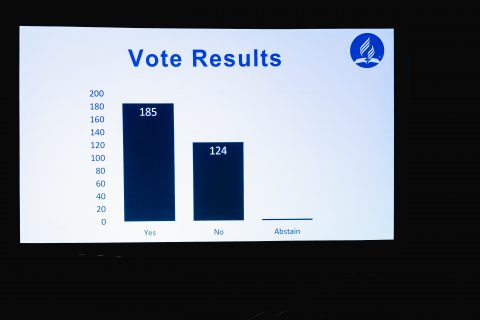
by Daniel McGrath | Oct 15, 2018 | Battle Creek, Michigan
Last night the General Conference (GC) Executive Committee voted to accept the unity document brought to the floor by the Unity and Oversight Committee with a near 60% majority. This document outlines the steps to be taken if and when an organization of the Seventh-day Adventist church is out of compliance with church policy.
The document states that if an entity of the church is perceived to be out of compliance, then the next highest and closest level of administration would be initially responsible for dealing with the issue. The review by the administration is to be done with prayerful dialogue throughout the process. The administration would need to notify in writing the perceived noncompliance issue to the entity in question.
Once the entity has received the letter, they have 60 days to provide evidence of compliance or a plan to achieve it. If they have not made evident their intent to comply, then a GC review committee may be requested to evaluate the matter and make recommendations to the appropriate administrative committee charged with handling the matter.
If matters remain unresolved then the issue is passed up to the next highest level of administration and they are charged with the responsibility to facilitate a process leading to compliance. If however, the organization in question does not comply, a discipline process is outlined in three phases that affects the entity or its’ elected leader.
- A warning is given if an entity of the church is following practices voted by the GC to be out of compliance with church constitution, bylaws or working policy. A warning applies to the entity and not to individuals.
- A public reprimand is given when the actions of the church are ignored. The Executive Committee will list the names of those on their committee who have received a public reprimand and will be notified of their noncompliance at the opening session of each spring and fall meeting.
- If noncompliance continues after the reprimand the representative member of the noncompliant entity can be removed from the Executive Committee for cause by a two-thirds majority vote of the same committee.
If compliance is achieved at any point in this process the recommendation will be to allow the individuals representing the noncompliant entities or the entities themselves back into regular leadership standing with the church.
The Executive Committee spent all of Sunday afternoon discussing the proposed document. The majority of those who spoke were not in favor of adopting the amendments. Yet after the vote was counted it became clear that the majority were in favor of the church moving forward with the recommended process. The vote passed with 185 in favor, 124 against and 2 abstentions.
Daniel McGrath serves as pastor for the Sparta and Three Angels Fellowship Seventh-day Adventist churches. He is also a contributing writer for the Communication Department of the Michigan Conference.
